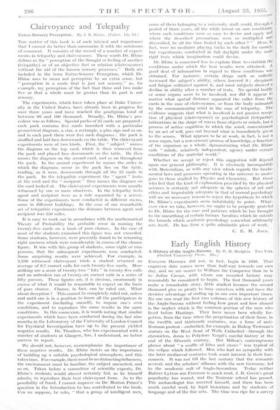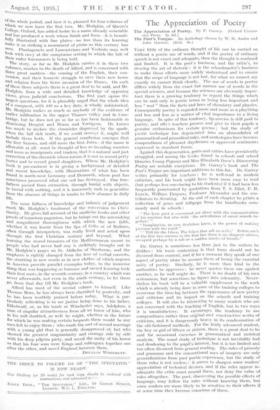Early English History
A History of the Anglo-Saxons. By R. H. Hodgkin. Two Vols. (Oxford University Press. 3,03.) .ENGLISII HISTORY did not, in fact,, begin in 1060. That engraver date comes more than half-way towards our own day, and we are nearer to William the Conqueror than he is to Julius Caesar, with whom our recorded history may reasonably be considered to begin. The first thousand years make a remarkable story, little studied because the second thousand give us plenty to busy ourselves with and have the decisive advantage of ending up in our own important times. No one can read the first two volumes of this new history of the Anglo-Saxons without feeling how great and how absurd is the neglect which is the common portion of the men who lived before Hastings. They have never been wholly for- gotten, from the time when the perpetuation of their fame, in the twelfth and thirteenth centuries, was a form of anti- Norman protest—embodied,•for example, in Bishop Trotinan's statues on the West front of .Wells Cathedral—through the chroniclers, down to Polydore Vergil's careful history at the end of the fifteenth century. But Milton's contemptuous of kites and crows " was typical of. phrase about " a scuffle
the eclipse which followed. Men who had no sympathy with the later mediaeval centuries took scant interest in their fore- runners. It was not till the last century that the romantic revival, and the scholars' alliance with the new Germany, led to the academic cult of Anglo-Saxondom. Today neither Bulwer Lytton nor Freeman is much read, J. R. Green's great popularity has waned, and the Teutonic school has passed. The archaeologist has asserted himself, and there has been Mitch careful work by legal historians and by students of language and of the fine. arts. The time was ripe for a survey
of the whole period, and here it is, planned for four volumes of College, we now have the first two. Mr. Hodgkin, of Queen's 'allege, Oxford, has added lustre to a name already venerable and has produced a work whose finish and form—it is beauti- fully illustrated with fine plates—no less than its learning make it as striking a monument of pietas as this century has seen. Plantagenets and Lancastrians and Yorkists may well look with envy at the sumptuous setting in which the tale of their ruder forerunners is being told.
The story, so far as Mr. Hodgkin carries it in these two volumes, reaches to the death of Alfred, and is concerned with 'three great matters—the coming of the English, their con- version, and their homeric struggle to save their new home and religionfrom the fierce invasion of the Danes. On each 9f.these three subjects there is a great deal to be said, and Mr. Hodgkin, from a wide and detailed knowledge of opposing views, gives judicial conclusions. The first part opens the largest questions, for it is plausibly urged that the whole idea of a conquest, with 449 as a key date, is wholly unhistorical. Mr. Hodgkin makes as much as anybody of the evidence of earlier infiltration in the upper Thames valley and in Cam- bridge, but he does not go so far as bus been fashionable in dismissing Hengist and Horsa and Vortigern. He knows too much to declare the chronicler disproved by the spade, When the full rich truth, if we could recover it, might well include them both. If the general conclusion emerges that the first Saxons, and still more the first Jutes—if the name is allowable at all—must be thought of less as invading warriors and more as immigrants and traders, that is a natural and just correction of the chronicle whose nature it is not to record petty hurter and to record grand slaughters. Where Mr. Hodgkin's book is pre-eminent is in giving a background of detailed and recent knowledge, with illustrations of what has been found in north-west Germany and Denmark, where peat has sometimes preserved what our soil has destroyed. Our fore- fathers passed from cremation, through burial with objects, to burial with nothing, and it is immensely rash to generalize from the absence of things in tombs to their absence in daily life.
The same fullness of knowledge and balance of judgement Mark Mr. Hodgkin's treatment of the conversion to Chris- tianity. He gives full account of the medicine books and other Proofs of tenacious paganism, but he brings out the astonishing and magnificent thoroughness with which the new faith, Whether it was learnt from the lips of Celts or of Italians, often through interpreters, was really lived and acted upon through the first Christian century and beyond. What learning the stored treasures of the Mediterranean meant to ,...PeoPle who had never had any is strikingly brought out in Mr. Hodgkin's pages on St. Aldhelm of Sherborne, and the emphasis is rightly changed from the love of verbal conceits, the strutting ill new words as in new clothes of which negroes in America provide parallel examples today, to the immense thing that was happening as humane and sacred learning took their first roots, in the seventh century, in a country which was never afterwards, not even in the ninth century, to let them go, from that day till Mr. Hodgkin's book. Alfred has most of the second volume to himself. Like
Thomas More, he has always been cherished by posterity, and he has been worthily praised before today. What is par- ticularly refreshing is to see. justice being done to his father, Ethelwulf, or, as his tomb at Winchester says, Adolphus, a Man of singular attractiveness from all we know of him, who in his will doubted, as well he might, whether in the future for which he was making certain bequests there would be any Men left to enjoy them ; who made the sort of second marriage With a young girl that is generally disapproved of, but who
.
showed the greatest magnanimity and courage side by side With his deep pilgrim piety, and saved the unity of his house so that his four sons were Kings and colleagues together one after the other, and saved England,between them.
DOUGLAS WOODRUFF,



































 Previous page
Previous page